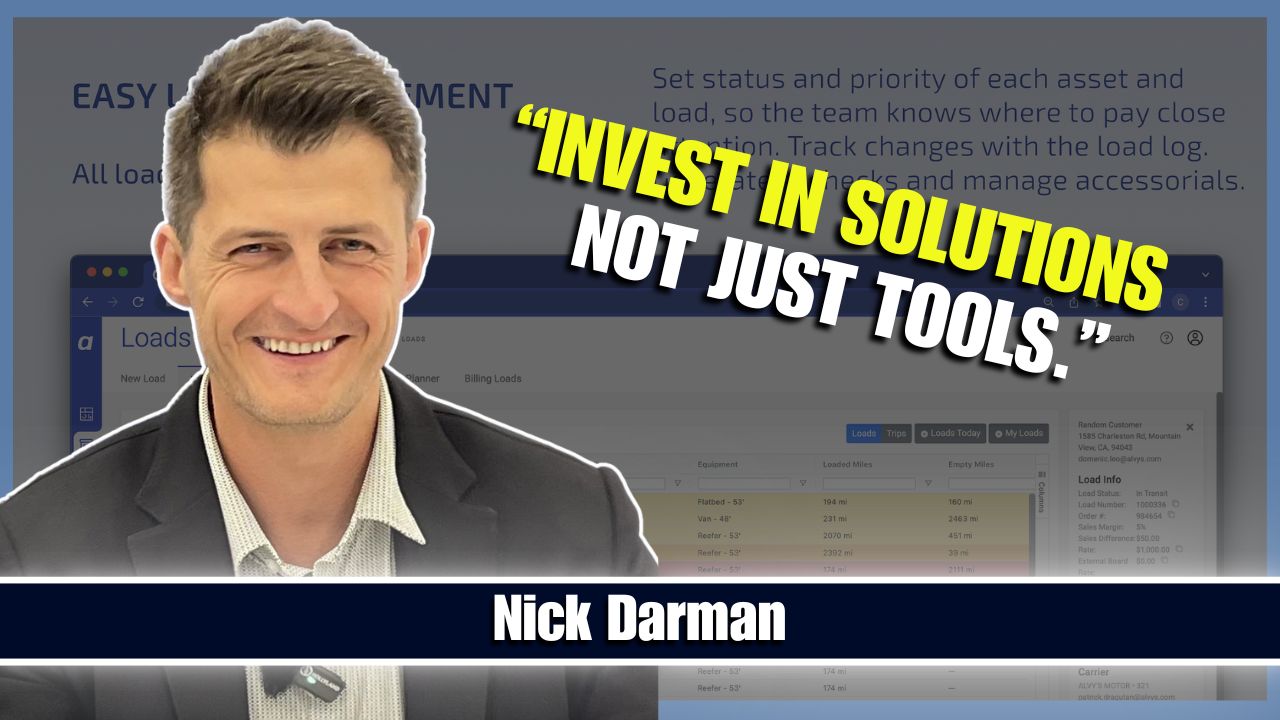This article is based on Episode 4 of the Miles and Mentors Podcast, where we spoke with Rob McCutcheon, Vice President of Strategy and Growth at TAFS. Rob’s journey into trucking wasn’t conventional—he began his career in college athletics and marketing—but over the past eight years, he’s become a trusted resource in transportation finance, especially for new and growing carriers. Through his role, Rob has helped thousands of owner-operators understand how to run a successful business, and in this episode, he breaks down one of the most important tools available to new trucking companies: freight factoring.
Factoring is about more than fast money
When you’re starting a trucking business, one of the first financial challenges you face is cash flow. As a company driver, you’re used to getting paid weekly. But once you’re running under your own authority, you quickly discover that most brokers and shippers don’t pay immediately. Instead, they operate on net terms—30, 60, sometimes even 90 days after delivery. That delay can be brutal when your truck payment, fuel bills, insurance, and maintenance costs are all due now.
Factoring solves that gap by giving you access to immediate cash. After you deliver a load and invoice the customer, you submit that invoice to a factoring company. They advance you a large percentage of the invoice value—usually between 80 and 95 percent—upfront. The factoring company then collects the full payment from the broker or shipper. Once it clears, they release the remaining balance to you, minus a small fee. That immediate funding can be the difference between staying on the road or sitting idle.
But as Rob explained, factoring isn’t just a shortcut to faster pay—it can also provide much-needed structure for new businesses. Factoring companies do more than move money. The good ones function like a financial back office, helping carriers build systems that support long-term growth.
Factoring can act like a financial back office for small carriers
Rob emphasized that most new carriers are one-person businesses. The same person driving the truck is also the dispatcher, accountant, and collections department. With so many hats to wear, it’s easy for important financial tasks to slip through the cracks. That’s where a good factoring partner steps in.
Factoring companies handle invoicing, verify load documentation, and follow up on collections so you don’t have to. They also offer credit checks on brokers and shippers, helping you avoid loads from customers who have a history of late payments or defaults. These services may not always be top of mind when a carrier is just trying to stay afloat, but they can make a major difference over time. A factoring partner with trucking industry experience can identify risks and spot patterns that a new business owner might miss.
In Rob’s words, “Anything that we can do to provide [carriers] more capabilities to succeed… we want to have a solution or an answer.” That philosophy turns a factoring relationship into a kind of mentorship. It’s not just about advancing money. It’s about sharing experience and building infrastructure.
Understanding recourse versus non-recourse is essential
One of the most important distinctions in any factoring agreement is whether it’s recourse or non-recourse. Rob pointed out that this is where a lot of confusion—and frustration—happens.
With recourse factoring, if your customer doesn’t pay, you are ultimately responsible for paying the factoring company back. With non-recourse factoring, the factoring company assumes that risk under certain conditions, such as if the broker declares bankruptcy. However, even non-recourse agreements often include exceptions that carriers don’t realize until it’s too late. If paperwork is incomplete, or if the dispute isn’t covered under the agreement, you might still be on the hook.
Rob stressed that many of the bad experiences people have with factoring come from misunderstanding these contract details. “Most of the misconceptions,” he said, “are mainly because somebody doesn’t understand how the whole process works.” This is why it’s essential to ask questions and fully understand your agreement before signing. A reputable company will walk you through it in plain language.
Factoring fees are only one part of the equation
Fees are a necessary part of any factoring service. The base rate usually falls between one and five percent, depending on how much you factor and how your agreement is structured. But as Rob explained, that’s only part of the picture. Some agreements include fees for submitting invoices, charges for same-day payments or wires, monthly minimums, and early termination penalties.
Understanding the full fee structure is just as important as understanding the advance rate. If a company offers a low rate but hides multiple fees in the fine print, you might end up paying more than expected. A good factoring partner is transparent about their costs and willing to explain how they apply to your specific business. Don’t be afraid to ask detailed questions. If the answers aren’t clear, that’s a sign to keep looking.
Factoring is a tool, not a forever plan
While factoring can provide critical support for new carriers, Rob cautions against relying on it as your only long-term strategy. The goal of any trucking business should be to build strong relationships with customers, manage cash flow efficiently, and eventually reach a point where you don’t need to factor every load.
In the early stages, though, factoring can be a lifeline. It provides stability, covers your expenses, and keeps you moving while you build your customer base. For many small carriers, it’s also the only option when banks or traditional lenders won’t provide credit. Used wisely, factoring is a tool that can help launch your business and keep it healthy through its most vulnerable phase. But it works best when it’s part of a larger plan that includes budgeting, forecasting, and building direct freight relationships.
Rob’s advice to new carriers is simple but powerful: know your costs, understand your contracts, and don’t be afraid to ask for help. Mentorship doesn’t always come in the form of a person—it can also come through working with partners who truly care about your success.
Need more mentor advice?
If you’re launching a trucking business and navigating the realities of delayed payments and cash flow uncertainty, factoring might be one of the tools that helps you stay on track. But like every tool, it works best when you understand how and when to use it. At Miles and Mentors, we’re here to help you connect with industry experts who’ve seen it all and want to help you avoid common pitfalls. We don’t offer factoring services ourselves, but we work with trusted partners who do—transparently, honestly, and with your long-term success in mind.
If you’d like to be connected with someone who can answer your questions, help you review your options, or walk you through what to expect, fill out the form below. We’ll make sure you get in touch with the right people.



